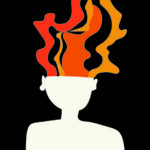A few weeks ago, I was browsing in a boutique in the Palisades, a part of Los Angeles that’s known for cliffs and big houses. The merchandise had a rustic appeal, meaning that it was anti-colorful and tattered on purpose, and the prices were high and ended in the number 8, which we all know is infinitely classier than its cheap neighbor, number 9. Near the cash register, I came across a tight stack of kraft paper that had been torn into small rectangular pieces. Wrapped around it, like a dinner napkin ring, was a fake-tarnished golden metal square that said, in cut-out letters, GOOD ADVICE. When I picked up this object—or maybe it’s an objét—I noticed three things. One, it was surprisingly heavy, which meant that its inventor had sunk most of their budget into the metal holder. Two, besides a few words peeping out on the sides of the holder, none of the advice was available for sampling, so how was one to know if it was good or not? And three, the price tag was $68.
Who was going to buy this elevated fortune cookie? I imagined its future owner as maybe someone who was uninterested in finance and dangerously open-minded. Who else would choose to entertain the intuitive knowing of a very audacious stranger, even perhaps at the expense of listening to their own inner voice?
I would like to make a case for close-mindedness. I understand that, according to popular thought, we should aspire to be open-minded, but here’s my question: who told us that and why are we listening?
I used to be really open-minded. As a kid, I developed a default setting that favored the opinions of others over my own, always assuming that anything anybody said to me was correct. If it wasn’t correct, it would take me at least 48 hours to figure that out.








